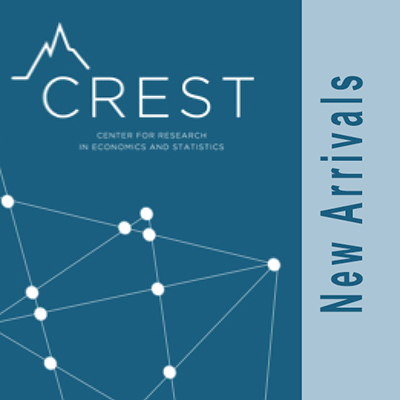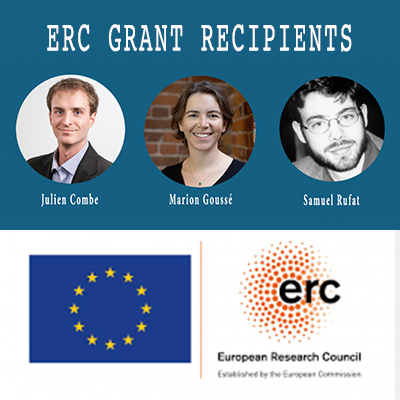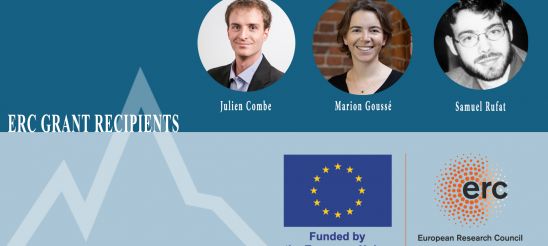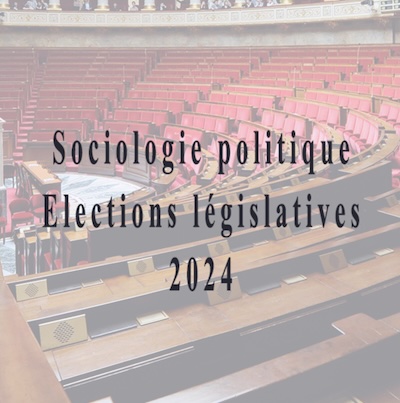2 Octobre 2024
Welcome at CREST: Introducing our latest recruits.
Each year, CREST goes beyond its borders to find new minds to keep on offering pioneer research. This year, CREST was able to attract new talents from all around the world (Canada, France, Italy, Switzerland, UEA, UK and USA). These new recruits bring with them a wealth of knowledge, diverse experiences, and a passion for pushing the boundaries of their respective fields. New recruits is always very much appreciated by our PhD students and students from ENSAE Paris, ENSAI and École polytechnique, where they may teach as they arrive with a different background and knowledge base.
As CREST continues to produce groundbreaking research about and for society, the arrival of these scholars marks a significant milestone in our journey. Each professor brings unique expertise that will not only enhance our ongoing projects but also open new avenues for exploration and discovery.
In this article, we will introduce you to our new researchers, delve into their backgrounds, and share their specializations that will contribute to the vibrant research environment at CREST.
Economics
Laurent Bach, Visiting Professor (ESSEC)

Interests: Entrepreneurial Finance, Corporate Governance, Household Finance, Public Economics, Political Economy
Current position: Laurent is currently and Associate Professor of Finance at ESSEC Business School
Laurent completed is PhD from Paris School of Economics in 2010
Federico Di Pace, Associate Professor (ENSAI)

Interests: Monetary Economics, macro-labor, international economics and applied econometrics
Previous position: Federico was previously a Senior Economist at the Bank of England.
Experienced Senior Economist with a demonstrated history of working in the academia and central banking, Federico conducted economic research with particular focus on labor markets and its interaction with monetary policy. He has conducted academic policy pieces using applied theory and time series econometrics. Federico completed his PhD in Economics at Birkbeck College, University of London.
https://sites.google.com/site/federicodipace/home?authuser=0
Yameng Fan, Assistant Professor (ENSAI)

Interests: Macroeconomics of labor markets, political economy, market power and spatial economics.
Previous position: PhD in Economics from Universitat Pompeu Fabra.
Florian Grosset, Assistant Professor (ENSAE Paris, Institut Polytechnique de Paris)

Interests: Development and environmental economics with interests in labor and firms
Previous position: PhD in Sustainable Development from Columbia University
The first strand of his research focuses on labor and networks in lower-income countries. His work explores how individuals’ labor supply decisions are influenced by their social network members, primarily with field experiments. The second strand of Florian’s research focuses on firms’ responses to environmental changes. It combines insights from the natural sciences with applied micro-economic tools for causal identification.
Marion Leroutier, Assistant Professor (ENSAE Paris, Institut Polytechnique de Paris)

Interests: Applied Environmental Economics focusing on two major environmental issues, ambient air pollution and climate change.
Previous position: Postdoctoral fellow at the Institute for Fiscal Studies.
Marion’s research agenda has two angles. First, she investigates the societal cost of air pollution and the causal impact of climate and environmental policies, with an emphasis on health, productivity and distributional effects. In a second and more early-stage angle, Marion studies the determinants of support for green policies, in particular the role of social norms and identity.
Bertille Picard, Assistant Professor (ENSAI)

Interests: Econometrics, Machine Learning applied to policy evaluation and inequalities.
Previous position: PhD in Economics at Aix-Marseille School of Economics (AMSE)
Yuki Tamura, Assistant Professor (École polytechnique, Institut Polytechnique de Paris)

Interests: Micoeconomic Theory, Market Design, Social Choice and Political Economy.
Previous position: Postdoctoral Associate at the Center for Behavioral Institutional Design, NUY Abu Dhabi.
Finance-Insurance
Roxana Dumitrescu, Associate Professor (ENSAE Paris, Institut Polytechnique de Paris)

Interests: Financial Mathematics, Stochastic Control, Stochastic Differential Games, Mean-field Games, Backward Stochastic Differential Equations, Energy Markets, Machine Learning.
Previous position: Associate Professor in Financial Mathematics at King’s College of London.
Sociology
Samuel Rufat, Assistant Professor (École polytechnique, Institut Polytechnique de Paris)

Interests: Urban Geography, Urban Studies, Spatial Analysis, Socio-Economic Inequalities, Segregation, Socio-Spatial Reconfigurations, Environmental justice, …
Previous position: Lecturer at CY Cergy Université Paris Cité (Géographie-cités)
Hesu Yoon, Assistant Professor (ENSAE Paris, Institut Polytechnique de Paris)

Interests: Inequality, Poverty, and mobility, Community and Urban Sociology, Race, Gender and Class, Cultural Sociology, Social Psychology, Computational Social Science, Mixed Methods.
Previous position: PhD in Sociology at Stanford University.
Hesu’s research asks longstanding questions about spatial inequality in urban sociology: Why do some neighborhoods (or cities) grow by attracting people and capital while others do not? How does this place stratification intersect with racial and class-based inequalities? Combining experimental, computational, and qualitative approaches, she interrogates high-status consumers and place entrepreneurs – such as business owners, landlords, and travel writers – who have the power to mold physical, economic, and symbolic urban landscapes.
Statistics
Vincent Divol, Assistant Professor (ENSAE Paris, Institut Polytechnique de Paris)

Interests: Topics at the intersection of statistics and geometry, including statistical optimal transport, geometric inference and topological data analysis.
Previous position: Junior AI Fellow at Université PSL.
Marie-Pierre Etienne, Associate Professor (ENSAI)

Interests: Development of statistical methods for ecology.
Previous position: Assistant Professor at Agrocampus Ouest.
Marie-Pierre is mainly interested in the use of stochastic processes to model and infer biological processes, particularly ecological processes.
Recently she focused mainly on movement ecology application and the development of statistical methods to extract knowledge from the study of animals, but also fishing vessels movement.
Sébastien Herbreteau, Assistant Professor (ENSAI)

Interests: Statistical and Machine Learning Methods for image processing, inverse problems, optimization and mathematical understanding of neural networks.
Previous position: Postdoctoral Fellow in the Biomedical Imaging Group at the Ecole Polytechnique Fédérale de Lausanne.
Emmanuel Pilliat, Assistant Professor (ENSAI)

Interests: Machine Learning and High-Dimensional Statistics.
Previous position: Postdoctoral Fellow at ENS Lyon.
Ludovic Stephan, Assistant Professor (ENSAI)

Interests: Random graphs, inference problems, machine learning theory.
Previous position: Postdoctoral Fellow in the idePHICS lab at Ecole Polytechnique Fédérale de Lausanne.
My research interests involve the rigorous study of statistical-physics inspired methods, from belief propagation to replica equations.
Welcome at CREST: Introducing our latest recruits.
Each year, CREST goes beyond its borders to find new minds to keep on offering pioneer research. This year, CREST was able to attract new talents from all around the world (Canada, France, Italy, Switzerland, UEA, UK and USA). These new recruits bring with them a wealth of knowledge, diverse experiences, and a passion for pushing the boundaries of their respective fields. New recruits is always very much appreciated by our PhD students and students from ENSAE Paris, ENSAI and École polytechnique, where they may teach as they arrive with a different background and knowledge base.
As CREST continues to produce groundbreaking research about and for society, the arrival of these scholars marks a significant milestone in our journey. Each professor brings unique expertise that will not only enhance our ongoing projects but also open new avenues for exploration and discovery.
In this article, we will introduce you to our new researchers, delve into their backgrounds, and share their specializations that will contribute to the vibrant research environment at CREST.
Economics
Laurent Bach, Visiting Professor (ESSEC)

Interests: Entrepreneurial Finance, Corporate Governance, Household Finance, Public Economics, Political Economy
Current position: Laurent is currently and Associate Professor of Finance at ESSEC Business School
Laurent completed is PhD from Paris School of Economics in 2010
Federico Di Pace, Associate Professor (ENSAI)

Interests: Monetary Economics, macro-labor, international economics and applied econometrics
Previous position: Federico was previously a Senior Economist at the Bank of England.
Experienced Senior Economist with a demonstrated history of working in the academia and central banking, Federico conducted economic research with particular focus on labor markets and its interaction with monetary policy. He has conducted academic policy pieces using applied theory and time series econometrics. Federico completed his PhD in Economics at Birkbeck College, University of London.
https://sites.google.com/site/federicodipace/home?authuser=0
Yameng Fan, Assistant Professor (ENSAI)

Interests: Macroeconomics of labor markets, political economy, market power and spatial economics.
Previous position: PhD in Economics from Universitat Pompeu Fabra.
Florian Grosset, Assistant Professor (ENSAE Paris, Institut Polytechnique de Paris)

Interests: Development and environmental economics with interests in labor and firms
Previous position: PhD in Sustainable Development from Columbia University
The first strand of his research focuses on labor and networks in lower-income countries. His work explores how individuals’ labor supply decisions are influenced by their social network members, primarily with field experiments. The second strand of Florian’s research focuses on firms’ responses to environmental changes. It combines insights from the natural sciences with applied micro-economic tools for causal identification.
Marion Leroutier, Assistant Professor (ENSAE Paris, Institut Polytechnique de Paris)

Interests: Applied Environmental Economics focusing on two major environmental issues, ambient air pollution and climate change.
Previous position: Postdoctoral fellow at the Institute for Fiscal Studies.
Marion’s research agenda has two angles. First, she investigates the societal cost of air pollution and the causal impact of climate and environmental policies, with an emphasis on health, productivity and distributional effects. In a second and more early-stage angle, Marion studies the determinants of support for green policies, in particular the role of social norms and identity.
Bertille Picard, Assistant Professor (ENSAI)

Interests: Econometrics, Machine Learning applied to policy evaluation and inequalities.
Previous position: PhD in Economics at Aix-Marseille School of Economics (AMSE)
Yuki Tamura, Assistant Professor (École polytechnique, Institut Polytechnique de Paris)

Interests: Micoeconomic Theory, Market Design, Social Choice and Political Economy.
Previous position: Postdoctoral Associate at the Center for Behavioral Institutional Design, NUY Abu Dhabi.
Finance-Insurance
Roxana Dumitrescu, Associate Professor (ENSAE Paris, Institut Polytechnique de Paris)

Interests: Financial Mathematics, Stochastic Control, Stochastic Differential Games, Mean-field Games, Backward Stochastic Differential Equations, Energy Markets, Machine Learning.
Previous position: Associate Professor in Financial Mathematics at King’s College of London.
Sociology
Samuel Rufat, Assistant Professor (École polytechnique, Institut Polytechnique de Paris)

Interests: Urban Geography, Urban Studies, Spatial Analysis, Socio-Economic Inequalities, Segregation, Socio-Spatial Reconfigurations, Environmental justice, …
Previous position: Lecturer at CY Cergy Université Paris Cité (Géographie-cités)
Hesu Yoon, Assistant Professor (ENSAE Paris, Institut Polytechnique de Paris)

Interests: Inequality, Poverty, and mobility, Community and Urban Sociology, Race, Gender and Class, Cultural Sociology, Social Psychology, Computational Social Science, Mixed Methods.
Previous position: PhD in Sociology at Stanford University.
Hesu’s research asks longstanding questions about spatial inequality in urban sociology: Why do some neighborhoods (or cities) grow by attracting people and capital while others do not? How does this place stratification intersect with racial and class-based inequalities? Combining experimental, computational, and qualitative approaches, she interrogates high-status consumers and place entrepreneurs – such as business owners, landlords, and travel writers – who have the power to mold physical, economic, and symbolic urban landscapes.
Statistics
Vincent Divol, Assistant Professor (ENSAE Paris, Institut Polytechnique de Paris)

Interests: Topics at the intersection of statistics and geometry, including statistical optimal transport, geometric inference and topological data analysis.
Previous position: Junior AI Fellow at Université PSL.
Marie-Pierre Etienne, Associate Professor (ENSAI)

Interests: Development of statistical methods for ecology.
Previous position: Assistant Professor at Agrocampus Ouest.
Marie-Pierre is mainly interested in the use of stochastic processes to model and infer biological processes, particularly ecological processes.
Recently she focused mainly on movement ecology application and the development of statistical methods to extract knowledge from the study of animals, but also fishing vessels movement.
Sébastien Herbreteau, Assistant Professor (ENSAI)

Interests: Statistical and Machine Learning Methods for image processing, inverse problems, optimization and mathematical understanding of neural networks.
Previous position: Postdoctoral Fellow in the Biomedical Imaging Group at the Ecole Polytechnique Fédérale de Lausanne.
Emmanuel Pilliat, Assistant Professor (ENSAI)

Interests: Machine Learning and High-Dimensional Statistics.
Previous position: Postdoctoral Fellow at ENS Lyon.
Ludovic Stephan, Assistant Professor (ENSAI)

Interests: Random graphs, inference problems, machine learning theory.
Previous position: Postdoctoral Fellow in the idePHICS lab at Ecole Polytechnique Fédérale de Lausanne.
My research interests involve the rigorous study of statistical-physics inspired methods, from belief propagation to replica equations.
3 CREST Researchers Receive European Research Council (ERC) Grants
Three researchers from CREST have been awarded prestigious grants by the European Research Council (ERC), highlighting their dedication to advancing research in the social and economic sciences. These three grants add to the three existing ERC projects underway at the laboratory, providing critical support for innovative research.
The funding will enable the researchers to delve deeper into their fields and explore a variety of important themes:
- The role of human behavior in the assessment and management of risks related to floods and other disasters.
- Improving the efficiency of allocation markets, especially when external options play a crucial role.
- Analyzing how the distribution of skills and workers in the economy is shaped by the interaction between the labor market, the marriage market, and multidimensional skills.
This article introduces the grant recipients, their backgrounds, and the goals of their ERC-funded research.
Julien Combe (CREST – École polytechnique): Market Design and Participation: Comprehensive Design for Matching Markets (MADPART)

Julien Combe, a Professor at École polytechnique, is a permanent researcher at CREST and an affiliated researcher at the Institut des Politiques Publiques and the Centre for Economic and Policy Research (CEPR). After obtaining his PhD from the Paris School of Economics in 2017, he worked as a Research Associate at University College London before joining CREST. Julien specializes in economics, particularly in theoretical and empirical market design.
In his current research, Julien explores dynamic centralized matching markets. He also examines how external options affect participation in matching markets. This research laid the groundwork for his ERC project by highlighting the need to incorporate these outside options into the design of these matching markets. These studies have opened new perspectives on designing more effective and inclusive policies.
“The ERC Starting Grant will allow me to push ambitious projects by allowing me to create an effective team of research around the topic with research assistants, a postdoctoral researcher and a PhD student. It will also allow me to fund an intervention to understand how families react to information in their participation decisions to daycare assignment procedures which would not have been possible otherwise. Last, it will also give the means to organize various events to gather researchers from the field and help to making the Parisian area a true European and world hub for Market Design.”
The ERC project MADPART aims to improve the design of assignment markets by considering external options and participation decisions. Many assignment markets, such as those for public school teachers, daycare placements, organ allocations, and social housing, operate with limited or no monetary transfers and are influenced by external opportunities. MADPART seeks to understand how these outside options discourage participation and undermine policy objectives, while also identifying innovative designs to enhance market functioning. By combining advanced theoretical models with cutting-edge empirical methods, the project will leverage unique and novel datasets from four assignment markets to analyze dynamic interactions with external options. The expected outcomes of MADPART aim to provide a more comprehensive understanding of assignment markets and potentially lead to significant policy innovations, allowing for better public resource allocation strategies that account for the choice of participants among multiple options.
Funded by the European Union (ERC STG 101162014). Views and opinions expressed are however those of the author only and do not necessarily reflect those of the European Union or the European Research Council Executive Agency.
Marion Goussé (CREST – GENES – ENSAI): Skills Markets: Marriage and Labor (SkiM2Lab)

Marion Goussé is an Associate Professor of Economics at ENSAI, permanent researcher at CREST in Bruz. She obtained her PhD from Sciences Po Paris and previously was a professor at Laval University in Canada. Marion is also a research affiliate at Institut des Politiques Publiques, IZA and she is a member of AFEPOP (Association Française des Économistes de la Population) and a network member of HCEO.
Marion Goussé’s previous research primarily addressed themes in labor and family economics. Her work focused on the determinants of labor income inequality, analyzing both intra-household dynamics and broader labor market patterns. She has applied advanced econometric techniques to understand the interplay between marriage markets, labor supply, and home production. This line of inquiry laid a strong foundation for her ERC project, demonstrating significant findings such as the impact of marriage market dynamics on labor supply decisions and the economic outcomes of households. Her current research continues to explore these themes, particularly examining how discrimination and family structures affect labor market outcomes.
“The ERC grant represents a unique opportunity to me to build an international team of researchers around my project with two postdocs, two PhDs students and with collaborators from Canada, Luxembourg and Sweden. This project is intensive in human capital as we will need to build, solve and estimate complex structural household matching models of the labor market using very rich databases. The project’s results will help answer broad impactful questions around the persistence and evolution of gender and regional gaps in skills, wages and marriage rates.”
The SkiM2Lab project aims to address gaps in understanding the distribution of workers across jobs and geographic areas, which has significant implications for growth, social welfare, and inequality. The project will develop state-of-the-art multidimensional matching models with two specific objectives:
- Labor and Marriage Markets Interactions: The project will analyze how labor and marriage markets intersect, using equilibrium models to understand the distribution of multidimensional skill sets across different geographic locations. This will shed light on how family and labor markets interact to influence wage disparities and occupational segregation by gender and region.
- Multidimensional Skills Matching: By leveraging big data, such as online resumes and job postings, alongside machine learning and natural language processing technologies, the project aims to identify and analyze skills at a granular level. This will enable the development of innovative models that better match skills to jobs, thereby enhancing understanding of the labor market dynamics and potentially informing more effective policy interventions.
The SkiM2Lab project represents a significant step forward in labor economics making a bridge between the fields of labor economics and family economics to better address the complex realities of modern labor and family life.
Funded by the European Union (ERC STG 101161432). Views and opinions expressed are however those of the author only and do not necessarily reflect those of the European Union or the European Research Council Executive Agency.
Samuel Rufat (CREST – École polytechnique): Filling the Behavioral Gap in Disaster Risk Reduction and Climate Change Adaptation (FiBeGa)

Samuel Rufat is a Professor of Geography at École polytechnique who recently joined the social sciences group of the CREST. He holds a joint European PhD from ENS Lyon and University of Bucharest, and a Habilitation from University Paris Cité. His research interests include urban geography, environmental inequalities, disaster risk reduction, climate change adaptation and computational social science. He is an expert with the Community of European Research and Innovation for Security (CERIS) Disaster Resilient Societies group for the European Commission. Previously, he was a Professor of Geography at CY Clergy Paris University and a fellow of the Institut Universitaire de France.
His current research explores the empirical validation of social vulnerability and resilience assessments and the role of human behavior in disaster outcomes. This research had laid the groundwork for an ERC project, which aims to refine the models and understanding of the impacts of disasters and climate change on metropolises, thereby informing more effective risk reduction strategies and adaptation policies.
“Competing theories from different fields are usually implemented on different case studies or respondents instead of being empirically compared. Some assume that risk awareness or information campaigns will lead to mitigation behavior, but the opposite has been repeatedly verified. This ERC grant allows for cross-validation, testing multiple theories from different fields, across different case studies, in space, short-term and long-term. Such an European funding is also the best opportunity to involve stakeholders from every level, from local authorities and citizen representatives to the European level, to inform policies, emergency management and male them more efficient, saving lives and public money.”
The FiBeGa project, “Filling the Behavioral Gap in Disaster Risk Reduction and Climate Change Adaptation”, aims to address a critical gap in current risk assessment methodologies: the lack of consideration for actual human behavior. Despite significant investments in disaster risk reduction, current policies often fail to reduce risks and losses effectively due to a mismatch between theoretical models and empirical reality. The EU vision of a disaster-and climate-resilient society cannot be achieved with the current approach. The ERC-funded FiBeGa project will lift existing barriers to predicting risk perception and behavior to foster a shift from “behavior-blind” to “behavior-aware” assessments and policies. By focusing on four major urban centers – Paris, Barcelona, Bucharest – the project will create demonstrators that provide a scalable and transferable model for improving disaster preparedness and response across diverse contexts. The outcomes of the FiBeGa project will include interactive, spatially explicit simulations that allow decision-makers to visualize and refine their strategies in real-time, fostering more resilient and adaptive communities in the face of increasing climate risks.
Funded by the European Union (ERC CoG 101044374). Views and opinions expressed are however those of the author only and do not necessarily reflect those of the European Union or the European Research Council Executive Agency.
3 CREST Researchers Receive European Research Council (ERC) Grants
Three researchers from CREST have been awarded prestigious grants by the European Research Council (ERC), highlighting their dedication to advancing research in the social and economic sciences. These three grants add to the three existing ERC projects underway at the laboratory, providing critical support for innovative research.
The funding will enable the researchers to delve deeper into their fields and explore a variety of important themes:
- The role of human behavior in the assessment and management of risks related to floods and other disasters.
- Improving the efficiency of allocation markets, especially when external options play a crucial role.
- Analyzing how the distribution of skills and workers in the economy is shaped by the interaction between the labor market, the marriage market, and multidimensional skills.
This article introduces the grant recipients, their backgrounds, and the goals of their ERC-funded research.
Julien Combe (CREST – École polytechnique): Market Design and Participation: Comprehensive Design for Matching Markets (MADPART)

Julien Combe, a Professor at École polytechnique, is a permanent researcher at CREST and an affiliated researcher at the Institut des Politiques Publiques and the Centre for Economic and Policy Research (CEPR). After obtaining his PhD from the Paris School of Economics in 2017, he worked as a Research Associate at University College London before joining CREST. Julien specializes in economics, particularly in theoretical and empirical market design.
In his current research, Julien explores dynamic centralized matching markets. He also examines how external options affect participation in matching markets. This research laid the groundwork for his ERC project by highlighting the need to incorporate these outside options into the design of these matching markets. These studies have opened new perspectives on designing more effective and inclusive policies.
“The ERC Starting Grant will allow me to push ambitious projects by allowing me to create an effective team of research around the topic with research assistants, a postdoctoral researcher and a PhD student. It will also allow me to fund an intervention to understand how families react to information in their participation decisions to daycare assignment procedures which would not have been possible otherwise. Last, it will also give the means to organize various events to gather researchers from the field and help to making the Parisian area a true European and world hub for Market Design.”
The ERC project MADPART aims to improve the design of assignment markets by considering external options and participation decisions. Many assignment markets, such as those for public school teachers, daycare placements, organ allocations, and social housing, operate with limited or no monetary transfers and are influenced by external opportunities. MADPART seeks to understand how these outside options discourage participation and undermine policy objectives, while also identifying innovative designs to enhance market functioning. By combining advanced theoretical models with cutting-edge empirical methods, the project will leverage unique and novel datasets from four assignment markets to analyze dynamic interactions with external options. The expected outcomes of MADPART aim to provide a more comprehensive understanding of assignment markets and potentially lead to significant policy innovations, allowing for better public resource allocation strategies that account for the choice of participants among multiple options.
Funded by the European Union (ERC STG 101162014). Views and opinions expressed are however those of the author only and do not necessarily reflect those of the European Union or the European Research Council Executive Agency.
Marion Goussé (CREST – GENES – ENSAI): Skills Markets: Marriage and Labor (SkiM2Lab)

Marion Goussé is an Associate Professor of Economics at ENSAI, permanent researcher at CREST in Bruz. She obtained her PhD from Sciences Po Paris and previously was a professor at Laval University in Canada. Marion is also a research affiliate at Institut des Politiques Publiques, IZA and she is a member of AFEPOP (Association Française des Économistes de la Population) and a network member of HCEO.
Marion Goussé’s previous research primarily addressed themes in labor and family economics. Her work focused on the determinants of labor income inequality, analyzing both intra-household dynamics and broader labor market patterns. She has applied advanced econometric techniques to understand the interplay between marriage markets, labor supply, and home production. This line of inquiry laid a strong foundation for her ERC project, demonstrating significant findings such as the impact of marriage market dynamics on labor supply decisions and the economic outcomes of households. Her current research continues to explore these themes, particularly examining how discrimination and family structures affect labor market outcomes.
“The ERC grant represents a unique opportunity to me to build an international team of researchers around my project with two postdocs, two PhDs students and with collaborators from Canada, Luxembourg and Sweden. This project is intensive in human capital as we will need to build, solve and estimate complex structural household matching models of the labor market using very rich databases. The project’s results will help answer broad impactful questions around the persistence and evolution of gender and regional gaps in skills, wages and marriage rates.”
The SkiM2Lab project aims to address gaps in understanding the distribution of workers across jobs and geographic areas, which has significant implications for growth, social welfare, and inequality. The project will develop state-of-the-art multidimensional matching models with two specific objectives:
- Labor and Marriage Markets Interactions: The project will analyze how labor and marriage markets intersect, using equilibrium models to understand the distribution of multidimensional skill sets across different geographic locations. This will shed light on how family and labor markets interact to influence wage disparities and occupational segregation by gender and region.
- Multidimensional Skills Matching: By leveraging big data, such as online resumes and job postings, alongside machine learning and natural language processing technologies, the project aims to identify and analyze skills at a granular level. This will enable the development of innovative models that better match skills to jobs, thereby enhancing understanding of the labor market dynamics and potentially informing more effective policy interventions.
The SkiM2Lab project represents a significant step forward in labor economics making a bridge between the fields of labor economics and family economics to better address the complex realities of modern labor and family life.
Funded by the European Union (ERC STG 101161432). Views and opinions expressed are however those of the author only and do not necessarily reflect those of the European Union or the European Research Council Executive Agency.
Samuel Rufat (CREST – École polytechnique): Filling the Behavioral Gap in Disaster Risk Reduction and Climate Change Adaptation (FiBeGa)

Samuel Rufat is a Professor of Geography at École polytechnique who recently joined the social sciences group of the CREST. He holds a joint European PhD from ENS Lyon and University of Bucharest, and a Habilitation from University Paris Cité. His research interests include urban geography, environmental inequalities, disaster risk reduction, climate change adaptation and computational social science. He is an expert with the Community of European Research and Innovation for Security (CERIS) Disaster Resilient Societies group for the European Commission. Previously, he was a Professor of Geography at CY Clergy Paris University and a fellow of the Institut Universitaire de France.
His current research explores the empirical validation of social vulnerability and resilience assessments and the role of human behavior in disaster outcomes. This research had laid the groundwork for an ERC project, which aims to refine the models and understanding of the impacts of disasters and climate change on metropolises, thereby informing more effective risk reduction strategies and adaptation policies.
“Competing theories from different fields are usually implemented on different case studies or respondents instead of being empirically compared. Some assume that risk awareness or information campaigns will lead to mitigation behavior, but the opposite has been repeatedly verified. This ERC grant allows for cross-validation, testing multiple theories from different fields, across different case studies, in space, short-term and long-term. Such an European funding is also the best opportunity to involve stakeholders from every level, from local authorities and citizen representatives to the European level, to inform policies, emergency management and male them more efficient, saving lives and public money.”
The FiBeGa project, “Filling the Behavioral Gap in Disaster Risk Reduction and Climate Change Adaptation”, aims to address a critical gap in current risk assessment methodologies: the lack of consideration for actual human behavior. Despite significant investments in disaster risk reduction, current policies often fail to reduce risks and losses effectively due to a mismatch between theoretical models and empirical reality. The EU vision of a disaster-and climate-resilient society cannot be achieved with the current approach. The ERC-funded FiBeGa project will lift existing barriers to predicting risk perception and behavior to foster a shift from “behavior-blind” to “behavior-aware” assessments and policies. By focusing on four major urban centers – Paris, Barcelona, Bucharest – the project will create demonstrators that provide a scalable and transferable model for improving disaster preparedness and response across diverse contexts. The outcomes of the FiBeGa project will include interactive, spatially explicit simulations that allow decision-makers to visualize and refine their strategies in real-time, fostering more resilient and adaptive communities in the face of increasing climate risks.
Funded by the European Union (ERC CoG 101044374). Views and opinions expressed are however those of the author only and do not necessarily reflect those of the European Union or the European Research Council Executive Agency.
CRESTive Columns: Yasmine Houri and The shaping power of social media platforms over online communications about Israel and Palestine

Yasmine is a PhD candidate in Sociology at CREST, Institut Polytechnique de Paris (France).
She is interested in understanding the social mechanisms underlying the diffusion of information on social media. She analyses how online social groups form and collectively assess the appropriateness of content with respect to their reference norms, values, and authority groups. As a case study, she is mapping networks of Telegram channels and observing the re-contextualization of polarised content across communities. Trained as a data scientist, she is committed to combining qualitative analysis with social networks and computational tools.
Glueing back the middleman: the shaping power of social media platforms over online communications about Israel and Palestine.
Social media have played a significant role in information and opinion sharing about military offenses in Israel and Gaza since the events of October 2023. On visual-based platforms like TikTok, war-related videos have generated billions of views. According to the Washington Post, by October 10th, the “#Palestine” and “#Israel” hashtags had respectively garnered 27.8 and 23 billion views on TikTok [1]. Although the documentation and spread of content related to Palestine and Israel on social media is not a new phenomenon, such viral and controversial topics are a growing concern for public policymakers and NGOs, as they often result in the dissemination of misleading information. In my research, I study the processes through which Internet users collectively judge the quality and appropriateness of information. I hope my work can shed light on how social norms and values frame the acceptance of potentially harmful information, notably in relation with contemporary geopolitical issues that are not commonly studied by computational sociologists.
My sociological approach to mass communication is inherited from Paul Lazarsfeld and Elihu Katz. According to the two-step flow of communication model, information flows from mass media to opinion leaders and from them to a wider population. Based on this hypothesis, the theory of personal influence embeds mass communication in structural and socio-contextual flows: areas of dense communication in a social network often revolve around central opinion leaders who are likely to share common interests, demographics, and socio-economic profile with their followers [2].
Yes, the social study of online information diffusion typically investigates the phenomenon of disintermediation, which refers to the fading mediation of institutions in individual access to information, or as Katz would phrase it, “what happens when a communicator invents a new medium, or adapts and extant one, to disintermediate some middleman” [3]. The paradox of disintermediation is that institutions are, by definition, a social structure characterized by a set of beliefs, norms, attitudes, and practices which are relatively stable in time and meant to regulate social interactions [4]. Their removal from the information sharing process would be a threat to social cohesion and information quality.
Historically, technological breakthroughs have consistently been accused of disrupting information diffusion processes and, thus, social order – in this regard, the World Wide Web is the latest suspect. In 1962, Canadian philosopher Marshall McLuhan already analysed the effects of mass media on European culture, and elaborated on the idea that mass communication turned the entire world into a “global village” [5]. According to this idea now known as the “media ecology theory” [6], our brains are constrained by new media communication to process information in a certain way which is ultimately reflected in social organizations. To illustrate this idea, Katz uses the telling example of the linearity of print, which forces readers to sequential cause-and-effect reasoning, a logic then imported in rational social forms such as the assembly line. With this in mind, in my research, I challenge the theory of disintermediation and investigate the power of the (new) media to influence the online masses on how to think and where to belong [3]. In this essay, I will focus on the former, and illustrate how my theoretical and empirical frameworks can be employed to study contemporary conflict in the Middle East.
How to think: distorted perceptions of the Palestinian reality through algorithmic frames of thinking and content-based communication.
Social media affordances, which are the various models of concepts, relations and entities that frame communications on each social media platform, directly influence individual and collective perceptions of mediatised content. In particular, the fast-paced and algorithmically-curated diffusion of short video content out of context represents a specific risk in times of conventional and informational warfare.
One of the most consequential effects of technological innovations is the considerable acceleration of the flow of information produced by laypeople. By allowing content to circulate further and deeper in worldwide communication networks, new technologies interfere with prior human relations to time and space, and the social consequences of this phenomenon are non-negligible. According to Kantian philosophy, time and space are a priori frames of perception, a lens through which humans perceive any object in the world. When technological innovations such as social media tamper with these frames, they radically disrupt the human perception of space-time reality, and in turn, threaten to interfere with the existing social order. In contemporary mass communication, instances of such disruptive innovations arguably include the prevalence of algorithmic recommendations and free access to generative artificial intelligence.
The current social media landscape is characterised by the soaring success of infinite scrolling through a curated selection of short video clips, a feature most salient on TikTok. Ever since the popularisation of this affordance, and especially over the past months, users have easily been pushed down a rabbit hole of war-related videos and partisan content. In the absence of institutional intermediation, the risk of disseminating misleading information and propaganda is tremendously high. This affordance itself can be particularly damaging when it comes to sharing graphic images of casualties and material destructions in Gaza and Israel because the content displayed looks more real, is consumed compulsively and out of context, and provides consumers with the illusion that they have direct access to the refugees and the victims’ reality through their screens, without them being consciously aware of the algorithmic mediation of their feed. The latter is particularly concerning considering that NGOs are accusing giant platforms of operating massive systemic censorship: between October and November 2023, Human Rights Watch reported that over 1,050 pro-Palestine accounts and contents were taken down on Instagram and Facebook, 1,049 of which are said to have involved peaceful content [7].
Yet, in a fast-paced technological environment where it has never been easier to access generative artificial intelligence models, some users are well-equipped to bypass algorithmic regulations. This was demonstrated after the attack on a refugee camp in Rafah on May 26th, when an artificially generated image posted on Instagram by a Malaysian user went viral. The image depicts a refugee camp, with rows of tents stretching as far as the eye can see in a desert surrounded by mountains. At the centre of the frame, the pro-Palestinian motto “All eyes on Rafah”, originally pronounced by Richard Peeperkorn, a representative of the World Health Organization, is laid out in capital letters as if formed by white tents. Many features of this sanitized image suggest that it was created to circumvent platform censorship and be massively shared: the text is shaped by objects, making it harder to monitor for basic language-detection algorithms than if it were directly included in the description, and the absence of bodies and violence amongst these perfectly aligned tents apparently respects terms of use guidelines on most social media platforms. A few days after being published, the visual already scored 47 million shares, but it quickly raised criticism from media and research experts. Indeed, the image does not actually represent Rafah at the time of publication, and as a matter of fact, it does not show a real place at all. In an interview to the BBC, Dr. Paul Reilly, a senior lecturer in Communications, Media and Democracy at the University of Glasgow, drew attention to the fact that content posted on social media by journalists in Gaza were the object of less attention than this watered-down representation of a fictitious Rafah [8]. In an interview to France 24, Dr. Giada Pistilli, head of ethics at Hugging Face, argued that the overwhelming presence of artificially generated images such as this one poses a threat to our collective memory [9].
As a computational sociologist, I am interested in collective perceptions of these phenomena, and in how they translate into online community building and information sharing. A major feature of content propagation on social media is the accelerating role of high-profile users. Whether it be the online profiles or real-life notorious figures, or individuals who make a career out of online content creating, such accounts prove to have a central role in information spreading for several reasons. First, because of the large size of their audience, they are central communicators whose posts have the potential to reach a significant number of other individuals. Furthermore, some of these high-profile users benefit either from real-life status or from online notoriety, and this endows them with a certain level of trust and establishment that might encourage their followers to relay their content with more confidence and a weaker critical appraisal. The fact that the “All eyes on Rafah” image was relayed by a number of celebrities on social media [10] is most certainly an illustration of this phenomenon.
The confrontation of content moderation accusations, algorithmic framing of content diffusion and artificially created war-related content sounds the alarm on the risks that social media communication poses to informational transparency and accuracy in collective appraisal of news content. When social media users encounter information related to Israel and Gaza, they are most often presented with a curated and fractionated snapshot of violent and partisan content, which impedes any accurate representation of the conflict in time and space.
To go further: identity politics in technocratic, privately-owned digital spaces.
My study of algorithmic framing and social influence on social media suggests a potential “re-intermediation” of information flows. In my current work, I seek to identify and characterise these intermediaries. Are they equivalent to those identified by McLuhan, Katz and Lazarsfeld during the last century? Are they the same ones but using different, newly born platforms? Or have completely unprecedented types of opinion leaders emerged, calling for a new theory of online intermediation? To answer these questions, I study the institutional role of giant social media platforms. I am particularly interested in the paradox that arises when authorities impose legal constraints on privately-owned, for-profit tech companies to regulate harmful content although the business model of these organisations specifically thrives on content virality. An interesting continuation to this research would seek to characterise how lobbying and partisanship among shareholders of the giant platforms impacts content moderation.
[1] Lorenz, Taylor (2023, October 10). “Why TikTok videos on Israel-Hamas war have drawn billions of views”. Washington Post.
https://www.washingtonpost.com/technology/2023/10/10/tiktok-hamas-israel-war-videos/
[2] Katz, E., Lazarsfeld, P. F., & Roper, E. (1955). Personal influence: The part played by people in the flow of mass communications. Routledge.
[3] Katz, E. (1988). Disintermediation: Cutting out the middle man. Intermedia, 16(2), 30-31.
[4] Hodgson, G. M. (2006). What are institutions?. Journal of economic issues, 40(1), 1-25.
[5] Marshall McLuhan (1962), The Gutenberg Galaxy: The Making of Typographic Man.
[6] Setiawan, H., Pawito, P., & Purwasito, A. (2022). Communication Behavior Use of Short Video Features by Adolescents. International Journal of Multicultural and Multireligious Understanding, 9(3), 710-716.
[7] Human Rights Watch. (2023, December 21). Meta’s broken promises: Systemic censorship of Palestine content on Instagram and Facebook. Retrieved from
https://www.hrw.org/report/2023/12/21/metas-broken-promises/systemic-censorship-palestine-content-instagram-and
[8] Alys Davies and BBC Arabic. (2024, May 30). All Eyes on Rafah: The post that’s been shared by more than 47m people. BBC News. https://www.bbc.com/news/articles/cjkkj5jejleo
[9] Barbara GABEL (2024, May 31). Gaza : “All eyes on Rafah”, une image virale qui “apaise nos consciences”. France 24.
https://www.france24.com/fr/moyen-orient/20240531-gaza-all-eyes-on-rafah-une-image-qui-apaise-nos-consciences
[10] NDTV (2024, May 29). Alia Bhatt To Dua Lipa: Celebs Draw Attention To Gaza After Rafah Horror.
https://www.ndtv.com/world-news/alia-bhatt-to-dua-lipa-celebs-who-shared-all-eyes-on-rafah-pic-5770022#:~:text=She%20posted%20an%20image%20with,show%20your%20solidarity%20with%20Gaza.%22
CRESTive Columns: Yasmine Houri and The shaping power of social media platforms over online communications about Israel and Palestine

Yasmine is a PhD candidate in Sociology at CREST, Institut Polytechnique de Paris (France).
She is interested in understanding the social mechanisms underlying the diffusion of information on social media. She analyses how online social groups form and collectively assess the appropriateness of content with respect to their reference norms, values, and authority groups. As a case study, she is mapping networks of Telegram channels and observing the re-contextualization of polarised content across communities. Trained as a data scientist, she is committed to combining qualitative analysis with social networks and computational tools.
Glueing back the middleman: the shaping power of social media platforms over online communications about Israel and Palestine.
Social media have played a significant role in information and opinion sharing about military offenses in Israel and Gaza since the events of October 2023. On visual-based platforms like TikTok, war-related videos have generated billions of views. According to the Washington Post, by October 10th, the “#Palestine” and “#Israel” hashtags had respectively garnered 27.8 and 23 billion views on TikTok [1]. Although the documentation and spread of content related to Palestine and Israel on social media is not a new phenomenon, such viral and controversial topics are a growing concern for public policymakers and NGOs, as they often result in the dissemination of misleading information. In my research, I study the processes through which Internet users collectively judge the quality and appropriateness of information. I hope my work can shed light on how social norms and values frame the acceptance of potentially harmful information, notably in relation with contemporary geopolitical issues that are not commonly studied by computational sociologists.
My sociological approach to mass communication is inherited from Paul Lazarsfeld and Elihu Katz. According to the two-step flow of communication model, information flows from mass media to opinion leaders and from them to a wider population. Based on this hypothesis, the theory of personal influence embeds mass communication in structural and socio-contextual flows: areas of dense communication in a social network often revolve around central opinion leaders who are likely to share common interests, demographics, and socio-economic profile with their followers [2].
Yes, the social study of online information diffusion typically investigates the phenomenon of disintermediation, which refers to the fading mediation of institutions in individual access to information, or as Katz would phrase it, “what happens when a communicator invents a new medium, or adapts and extant one, to disintermediate some middleman” [3]. The paradox of disintermediation is that institutions are, by definition, a social structure characterized by a set of beliefs, norms, attitudes, and practices which are relatively stable in time and meant to regulate social interactions [4]. Their removal from the information sharing process would be a threat to social cohesion and information quality.
Historically, technological breakthroughs have consistently been accused of disrupting information diffusion processes and, thus, social order – in this regard, the World Wide Web is the latest suspect. In 1962, Canadian philosopher Marshall McLuhan already analysed the effects of mass media on European culture, and elaborated on the idea that mass communication turned the entire world into a “global village” [5]. According to this idea now known as the “media ecology theory” [6], our brains are constrained by new media communication to process information in a certain way which is ultimately reflected in social organizations. To illustrate this idea, Katz uses the telling example of the linearity of print, which forces readers to sequential cause-and-effect reasoning, a logic then imported in rational social forms such as the assembly line. With this in mind, in my research, I challenge the theory of disintermediation and investigate the power of the (new) media to influence the online masses on how to think and where to belong [3]. In this essay, I will focus on the former, and illustrate how my theoretical and empirical frameworks can be employed to study contemporary conflict in the Middle East.
How to think: distorted perceptions of the Palestinian reality through algorithmic frames of thinking and content-based communication.
Social media affordances, which are the various models of concepts, relations and entities that frame communications on each social media platform, directly influence individual and collective perceptions of mediatised content. In particular, the fast-paced and algorithmically-curated diffusion of short video content out of context represents a specific risk in times of conventional and informational warfare.
One of the most consequential effects of technological innovations is the considerable acceleration of the flow of information produced by laypeople. By allowing content to circulate further and deeper in worldwide communication networks, new technologies interfere with prior human relations to time and space, and the social consequences of this phenomenon are non-negligible. According to Kantian philosophy, time and space are a priori frames of perception, a lens through which humans perceive any object in the world. When technological innovations such as social media tamper with these frames, they radically disrupt the human perception of space-time reality, and in turn, threaten to interfere with the existing social order. In contemporary mass communication, instances of such disruptive innovations arguably include the prevalence of algorithmic recommendations and free access to generative artificial intelligence.
The current social media landscape is characterised by the soaring success of infinite scrolling through a curated selection of short video clips, a feature most salient on TikTok. Ever since the popularisation of this affordance, and especially over the past months, users have easily been pushed down a rabbit hole of war-related videos and partisan content. In the absence of institutional intermediation, the risk of disseminating misleading information and propaganda is tremendously high. This affordance itself can be particularly damaging when it comes to sharing graphic images of casualties and material destructions in Gaza and Israel because the content displayed looks more real, is consumed compulsively and out of context, and provides consumers with the illusion that they have direct access to the refugees and the victims’ reality through their screens, without them being consciously aware of the algorithmic mediation of their feed. The latter is particularly concerning considering that NGOs are accusing giant platforms of operating massive systemic censorship: between October and November 2023, Human Rights Watch reported that over 1,050 pro-Palestine accounts and contents were taken down on Instagram and Facebook, 1,049 of which are said to have involved peaceful content [7].
Yet, in a fast-paced technological environment where it has never been easier to access generative artificial intelligence models, some users are well-equipped to bypass algorithmic regulations. This was demonstrated after the attack on a refugee camp in Rafah on May 26th, when an artificially generated image posted on Instagram by a Malaysian user went viral. The image depicts a refugee camp, with rows of tents stretching as far as the eye can see in a desert surrounded by mountains. At the centre of the frame, the pro-Palestinian motto “All eyes on Rafah”, originally pronounced by Richard Peeperkorn, a representative of the World Health Organization, is laid out in capital letters as if formed by white tents. Many features of this sanitized image suggest that it was created to circumvent platform censorship and be massively shared: the text is shaped by objects, making it harder to monitor for basic language-detection algorithms than if it were directly included in the description, and the absence of bodies and violence amongst these perfectly aligned tents apparently respects terms of use guidelines on most social media platforms. A few days after being published, the visual already scored 47 million shares, but it quickly raised criticism from media and research experts. Indeed, the image does not actually represent Rafah at the time of publication, and as a matter of fact, it does not show a real place at all. In an interview to the BBC, Dr. Paul Reilly, a senior lecturer in Communications, Media and Democracy at the University of Glasgow, drew attention to the fact that content posted on social media by journalists in Gaza were the object of less attention than this watered-down representation of a fictitious Rafah [8]. In an interview to France 24, Dr. Giada Pistilli, head of ethics at Hugging Face, argued that the overwhelming presence of artificially generated images such as this one poses a threat to our collective memory [9].
As a computational sociologist, I am interested in collective perceptions of these phenomena, and in how they translate into online community building and information sharing. A major feature of content propagation on social media is the accelerating role of high-profile users. Whether it be the online profiles or real-life notorious figures, or individuals who make a career out of online content creating, such accounts prove to have a central role in information spreading for several reasons. First, because of the large size of their audience, they are central communicators whose posts have the potential to reach a significant number of other individuals. Furthermore, some of these high-profile users benefit either from real-life status or from online notoriety, and this endows them with a certain level of trust and establishment that might encourage their followers to relay their content with more confidence and a weaker critical appraisal. The fact that the “All eyes on Rafah” image was relayed by a number of celebrities on social media [10] is most certainly an illustration of this phenomenon.
The confrontation of content moderation accusations, algorithmic framing of content diffusion and artificially created war-related content sounds the alarm on the risks that social media communication poses to informational transparency and accuracy in collective appraisal of news content. When social media users encounter information related to Israel and Gaza, they are most often presented with a curated and fractionated snapshot of violent and partisan content, which impedes any accurate representation of the conflict in time and space.
To go further: identity politics in technocratic, privately-owned digital spaces.
My study of algorithmic framing and social influence on social media suggests a potential “re-intermediation” of information flows. In my current work, I seek to identify and characterise these intermediaries. Are they equivalent to those identified by McLuhan, Katz and Lazarsfeld during the last century? Are they the same ones but using different, newly born platforms? Or have completely unprecedented types of opinion leaders emerged, calling for a new theory of online intermediation? To answer these questions, I study the institutional role of giant social media platforms. I am particularly interested in the paradox that arises when authorities impose legal constraints on privately-owned, for-profit tech companies to regulate harmful content although the business model of these organisations specifically thrives on content virality. An interesting continuation to this research would seek to characterise how lobbying and partisanship among shareholders of the giant platforms impacts content moderation.
[1] Lorenz, Taylor (2023, October 10). “Why TikTok videos on Israel-Hamas war have drawn billions of views”. Washington Post.
https://www.washingtonpost.com/technology/2023/10/10/tiktok-hamas-israel-war-videos/
[2] Katz, E., Lazarsfeld, P. F., & Roper, E. (1955). Personal influence: The part played by people in the flow of mass communications. Routledge.
[3] Katz, E. (1988). Disintermediation: Cutting out the middle man. Intermedia, 16(2), 30-31.
[4] Hodgson, G. M. (2006). What are institutions?. Journal of economic issues, 40(1), 1-25.
[5] Marshall McLuhan (1962), The Gutenberg Galaxy: The Making of Typographic Man.
[6] Setiawan, H., Pawito, P., & Purwasito, A. (2022). Communication Behavior Use of Short Video Features by Adolescents. International Journal of Multicultural and Multireligious Understanding, 9(3), 710-716.
[7] Human Rights Watch. (2023, December 21). Meta’s broken promises: Systemic censorship of Palestine content on Instagram and Facebook. Retrieved from
https://www.hrw.org/report/2023/12/21/metas-broken-promises/systemic-censorship-palestine-content-instagram-and
[8] Alys Davies and BBC Arabic. (2024, May 30). All Eyes on Rafah: The post that’s been shared by more than 47m people. BBC News. https://www.bbc.com/news/articles/cjkkj5jejleo
[9] Barbara GABEL (2024, May 31). Gaza : “All eyes on Rafah”, une image virale qui “apaise nos consciences”. France 24.
https://www.france24.com/fr/moyen-orient/20240531-gaza-all-eyes-on-rafah-une-image-qui-apaise-nos-consciences
[10] NDTV (2024, May 29). Alia Bhatt To Dua Lipa: Celebs Draw Attention To Gaza After Rafah Horror.
https://www.ndtv.com/world-news/alia-bhatt-to-dua-lipa-celebs-who-shared-all-eyes-on-rafah-pic-5770022#:~:text=She%20posted%20an%20image%20with,show%20your%20solidarity%20with%20Gaza.%22
Dissolution de l’Assemblée nationale et nouveau paysage politique : Etienne Ollion dans les médias
Etienne Ollion, sociologue et directeur de recherche au CNRS et professeur à l’Ecole polytechnique est spécialiste de sociologie politique. En 2017, Etienne Ollion mène une longue enquête à l’Assemblée nationale afin d’étudier la place des novices sous la présidence d’Emmanuel Macron, qui fera l’objet de son ouvrage publié aux éditions PUF, Les Candidats. Novices et professionnels en politique (2021).
En juin 2024, à la suite des résultats aux élections européennes, le président Emmanuel Macron a annoncé la dissolution de l’Assemblée nationale. Cette décision intervient après une victoire significative du Rassemblement National (RN) aux élections européennes, où le parti a obtenu 31,5 % des voix, devançant la liste de la majorité présidentielle (14,5 %).
La dissolution de l’Assemblée nationale entraîne la suspension immédiate de tous les travaux parlementaires en cours, y compris des projets de loi importants. De nouvelles élections législatives sont prévues les 30 juin et 7 juillet 2024. Ce type de dissolution est rare, la dernière remontant à 1997 sous Jacques Chirac.
Etienne Ollion, ayant largement étudié, la composition de l’assemblée, son fonctionnement, et plus récemment la situation en italienne avec l’arrivée au pouvoir de Giorgia Meloni, a été interviewé par de nombreux médias.
Emma Bonutti d’Agostini, doctorante en première année sous la supervision d’Etienne Ollion, s’intéresse à la circulation du discours et de l’idéologie de l’extrême droite dans les sphères journalistiques et médiatiques en France et en Italie. Elle a également été sollicité sur ses travaux par le journal Le Pèlerin : https://www.lepelerin.com/monde/decryptage/quel-est-le-bilan-pour-les-5-pays-d-europe-dans-lesquels-l-extreme-droite-gouverne-9867
Presse écrite
L’Express :
03/07/2024
https://www.lexpress.fr/idees-et-debats/etienne-ollion-bardella-au-pouvoir-pourrait-avoir-un-impact-bien-plus-fort-que-meloni-en-italie-XBQVX6R7PJDD7ITJZP55QIGPXM/?utm_medium=Social&utm_source=Twitter#Echobox=1720002052
L’Echo :
29/06/24
https://www.lecho.be/opinions/general/etienne-ollion-en-cas-de-victoire-du-rn-en-france-le-chef-serait-le-premier-ministre-et-non-le-president/10553529.html
AOC Media :
23/06/24
https://aoc.media/opinion/2024/06/23/le-mythe-de-limmunite-des-democraties-a-lautoritarisme/
La Nouvelle République :
23/06/2024
https://www.lanouvellerepublique.fr/a-la-une/l-arrivee-au-pouvoir-de-bardella-aurait-un-impact-plus-fort-que-celle-de-meloni-en-italie
Nice-Matin :
23/06/2024
https://www.pressreader.com/france/nice-matin-menton/20240623/282102051853070
Le Télégramme :
Le 23/06/24 :
https://www.letelegramme.fr/france/peut-on-comparer-giorgia-meloni-en-italie-et-jordan-bardella-en-france-6610523.php
06/07/24
https://www.letelegramme.fr/elections/legislatives/dans-une-coalition-ce-nest-pas-toujours-le-parti-du-milieu-qui-gouverne-6620952.php
France Infos :
03/07/24
https://www.francetvinfo.fr/elections/legislatives/legislatives-2024-comment-la-figure-de-jean-luc-melenchon-est-devenue-plus-repoussoir-que-celle-de-marine-le-pen_6639738.html
Le Nouvel Obs :
3/07/24
https://www.nouvelobs.com/idees/20240703.OBS90607/a-l-assemblee-des-deputes-lfi-anti-republicains-ou-ultra-republicains.html
9/07/24
https://www.nouvelobs.com/politique/20240709.OBS90886/legislatives-le-sursaut-et-l-inconnu.html
10/07/24
https://www.nouvelobs.com/politique/20240710.OBS90972/l-immense-majorite-des-pays-europeens-a-un-gouvernement-de-coalition-la-france-constitue-une-exception.html
Podcasts :
France Culture :
1/07/24
https://www.radiofrance.fr/franceculture/podcasts/france-culture-va-plus-loin-l-invite-e-des-matins/apres-le-premier-tour-des-elections-legislatives-la-resurrection-d-un-front-republicain-1520144
Vidéos :
Regards #LaMidinale :
21 juin 2024
https://regards.fr/sans-majorite-macron-pourrait-nommer-un-premier-ministre-entoure-par-un-gouvernement-technique/
Mediapart _ Soirées électorales :
Le 30/06/24 :
https://www.mediapart.fr/journal/politique/300624/legislatives-la-soiree-electorale-en-direct#at_medium=custom7&at_campaign=1047
Le 7/07/24 :
https://www.mediapart.fr/journal/politique/050724/dimanche-7-juillet-19-h-30-la-soiree-electorale-en-direct-sur-mediapart
Dissolution de l’Assemblée nationale et nouveau paysage politique : Etienne Ollion dans les médias
Etienne Ollion, sociologue et directeur de recherche au CNRS et professeur à l’Ecole polytechnique est spécialiste de sociologie politique. En 2017, Etienne Ollion mène une longue enquête à l’Assemblée nationale afin d’étudier la place des novices sous la présidence d’Emmanuel Macron, qui fera l’objet de son ouvrage publié aux éditions PUF, Les Candidats. Novices et professionnels en politique (2021).
En juin 2024, à la suite des résultats aux élections européennes, le président Emmanuel Macron a annoncé la dissolution de l’Assemblée nationale. Cette décision intervient après une victoire significative du Rassemblement National (RN) aux élections européennes, où le parti a obtenu 31,5 % des voix, devançant la liste de la majorité présidentielle (14,5 %).
La dissolution de l’Assemblée nationale entraîne la suspension immédiate de tous les travaux parlementaires en cours, y compris des projets de loi importants. De nouvelles élections législatives sont prévues les 30 juin et 7 juillet 2024. Ce type de dissolution est rare, la dernière remontant à 1997 sous Jacques Chirac.
Etienne Ollion, ayant largement étudié, la composition de l’assemblée, son fonctionnement, et plus récemment la situation en italienne avec l’arrivée au pouvoir de Giorgia Meloni, a été interviewé par de nombreux médias.
Emma Bonutti d’Agostini, doctorante en première année sous la supervision d’Etienne Ollion, s’intéresse à la circulation du discours et de l’idéologie de l’extrême droite dans les sphères journalistiques et médiatiques en France et en Italie. Elle a également été sollicité sur ses travaux par le journal Le Pèlerin : https://www.lepelerin.com/monde/decryptage/quel-est-le-bilan-pour-les-5-pays-d-europe-dans-lesquels-l-extreme-droite-gouverne-9867
Presse écrite
L’Express :
03/07/2024
https://www.lexpress.fr/idees-et-debats/etienne-ollion-bardella-au-pouvoir-pourrait-avoir-un-impact-bien-plus-fort-que-meloni-en-italie-XBQVX6R7PJDD7ITJZP55QIGPXM/?utm_medium=Social&utm_source=Twitter#Echobox=1720002052
L’Echo :
29/06/24
https://www.lecho.be/opinions/general/etienne-ollion-en-cas-de-victoire-du-rn-en-france-le-chef-serait-le-premier-ministre-et-non-le-president/10553529.html
AOC Media :
23/06/24
https://aoc.media/opinion/2024/06/23/le-mythe-de-limmunite-des-democraties-a-lautoritarisme/
La Nouvelle République :
23/06/2024
https://www.lanouvellerepublique.fr/a-la-une/l-arrivee-au-pouvoir-de-bardella-aurait-un-impact-plus-fort-que-celle-de-meloni-en-italie
Nice-Matin :
23/06/2024
https://www.pressreader.com/france/nice-matin-menton/20240623/282102051853070
Le Télégramme :
Le 23/06/24 :
https://www.letelegramme.fr/france/peut-on-comparer-giorgia-meloni-en-italie-et-jordan-bardella-en-france-6610523.php
06/07/24
https://www.letelegramme.fr/elections/legislatives/dans-une-coalition-ce-nest-pas-toujours-le-parti-du-milieu-qui-gouverne-6620952.php
France Infos :
03/07/24
https://www.francetvinfo.fr/elections/legislatives/legislatives-2024-comment-la-figure-de-jean-luc-melenchon-est-devenue-plus-repoussoir-que-celle-de-marine-le-pen_6639738.html
Le Nouvel Obs :
3/07/24
https://www.nouvelobs.com/idees/20240703.OBS90607/a-l-assemblee-des-deputes-lfi-anti-republicains-ou-ultra-republicains.html
9/07/24
https://www.nouvelobs.com/politique/20240709.OBS90886/legislatives-le-sursaut-et-l-inconnu.html
10/07/24
https://www.nouvelobs.com/politique/20240710.OBS90972/l-immense-majorite-des-pays-europeens-a-un-gouvernement-de-coalition-la-france-constitue-une-exception.html
Podcasts :
France Culture :
1/07/24
https://www.radiofrance.fr/franceculture/podcasts/france-culture-va-plus-loin-l-invite-e-des-matins/apres-le-premier-tour-des-elections-legislatives-la-resurrection-d-un-front-republicain-1520144
Vidéos :
Regards #LaMidinale :
21 juin 2024
https://regards.fr/sans-majorite-macron-pourrait-nommer-un-premier-ministre-entoure-par-un-gouvernement-technique/
Mediapart _ Soirées électorales :
Le 30/06/24 :
https://www.mediapart.fr/journal/politique/300624/legislatives-la-soiree-electorale-en-direct#at_medium=custom7&at_campaign=1047
Le 7/07/24 :
https://www.mediapart.fr/journal/politique/050724/dimanche-7-juillet-19-h-30-la-soiree-electorale-en-direct-sur-mediapart
Le streaming et le live : les nouveaux moyens de levée de fonds de grande ampleur, Samuel Coavoux interviewé sur ces nouvelles dynamiques solidaires
L’opération “Streamers 4 Palestinians”, une mobilisation internationale de streamers sur la plateforme Twitch, a permis la levée de fond de plus d’un million d’euros au profit de Médecins du monde. Comment les plateformes numériques facilitent-ils ce genre d’opérations? Samuel Coavoux, sociologue au CREST-GENES a été interviewé par l’AFP à propos de ses recherches. Il avance que Twitch est particulièrement adapté pour les opérations caritatives du fait des proximités formes entre la levée de fond caritative et le travail ordinaire des streamers.
Lien vers l’article scientifique : https://www.cairn.info/revue-reseaux-2020-6-page-169.htm
Articles de presse :
Le Figaro :
Publié le 03/06/2024
BFM TV :
Le 03/06/2024
Le Parisien :
Publié le 03/06/2024










